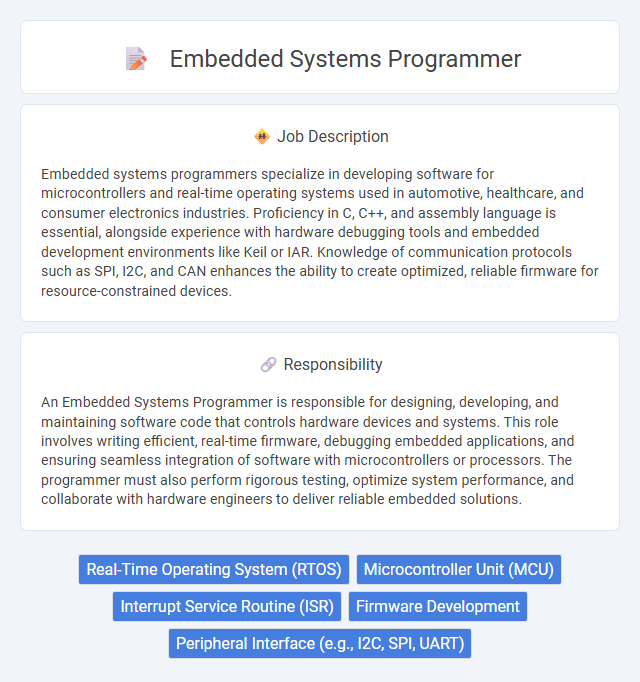
Embedded systems programmers specialize in developing software for microcontrollers and real-time operating systems used in automotive, healthcare, and consumer electronics industries. Proficiency in C, C++, and assembly language is essential, alongside experience with hardware debugging tools and embedded development environments like Keil or IAR. Knowledge of communication protocols such as SPI, I2C, and CAN enhances the ability to create optimized, reliable firmware for resource-constrained devices.
Individuals with strong analytical skills and attention to detail are likely suitable for embedded systems programmer roles, as the job often requires precise coding and debugging in resource-constrained environments. Those who enjoy working with hardware-software integration and can handle complex problem-solving under pressure may find this career fulfilling. Conversely, individuals who prefer highly social or non-technical work might find this role less aligned with their strengths and interests.
Qualification
Embedded systems programmers require strong proficiency in C and C++ programming languages, alongside a deep understanding of microcontrollers, real-time operating systems (RTOS), and hardware interfacing. Expertise in debugging tools, such as JTAG and logic analyzers, and familiarity with communication protocols like SPI, I2C, and UART are essential qualifications. Candidates should demonstrate experience in developing firmware for constrained environments and ensuring system reliability and optimization.
Responsibility
An Embedded Systems Programmer is responsible for designing, developing, and maintaining software code that controls hardware devices and systems. This role involves writing efficient, real-time firmware, debugging embedded applications, and ensuring seamless integration of software with microcontrollers or processors. The programmer must also perform rigorous testing, optimize system performance, and collaborate with hardware engineers to deliver reliable embedded solutions.
Benefit
Embedded systems programmer roles likely offer significant benefits such as high demand in various industries including automotive, healthcare, and consumer electronics, which could translate into strong job security. Competitive salaries are probably common due to the specialized skill set required. Opportunities for continuous learning and working on cutting-edge technologies might also be prevalent, enhancing career growth potential.
Challenge
Embedded systems programmer roles often present complex challenges involving real-time constraints and limited hardware resources, requiring precise coding and deep understanding of system architecture. The likelihood of facing debugging difficulties due to hardware-software integration issues is high, demanding strong problem-solving skills. Probable continuous learning and adaptation to evolving technologies make this job both demanding and stimulating.
Career Advancement
Embedded systems programmers develop and optimize software for hardware devices, enhancing performance and reliability in industries such as automotive, aerospace, and IoT. Mastery of low-level programming languages like C and assembly, along with expertise in real-time operating systems, opens pathways to senior engineer or systems architect roles. Continuous learning of emerging technologies like embedded AI and cybersecurity strengthens career progression and leadership opportunities.
Key Terms
Real-Time Operating System (RTOS)
An Embedded Systems Programmer specializing in Real-Time Operating Systems (RTOS) develops and maintains software that ensures timely and deterministic responses in hardware systems. Mastery of RTOS concepts such as task scheduling, interrupt handling, and inter-process communication is critical for optimizing system performance and reliability. Proficiency in languages like C or C++ combined with experience in debugging and performance tuning within RTOS environments significantly enhances embedded application efficiency.
Microcontroller Unit (MCU)
Embedded systems programmers specialize in developing software for Microcontroller Units (MCUs) to control hardware functions in various applications such as automotive, consumer electronics, and industrial automation. Expertise in low-level programming languages like C and assembly is essential to optimize real-time performance and memory usage. Proficiency in debugging tools, hardware interfaces (SPI, I2C, UART), and real-time operating systems (RTOS) enhances the ability to create efficient and reliable embedded solutions.
Interrupt Service Routine (ISR)
Embedded systems programmers specialize in designing and implementing efficient Interrupt Service Routines (ISRs) to handle hardware interrupts, ensuring real-time responsiveness and minimal latency. Mastery in low-level languages like C and assembly is essential for optimizing ISR execution and maintaining system stability. Expertise in microcontroller architectures and interrupt prioritization enhances the ability to manage multiple interrupts effectively within constrained resources.
Firmware Development
Embedded systems programmers specialize in firmware development, writing low-level code that directly controls hardware components in devices like microcontrollers, sensors, and IoT gadgets. They utilize programming languages such as C, C++, and assembly to optimize system performance and ensure real-time operation in resource-constrained environments. Expertise in debugging tools, hardware interfaces (SPI, I2C, UART), and RTOS integration is critical for developing reliable, efficient embedded firmware.
Peripheral Interface (e.g., I2C, SPI, UART)
Embedded systems programmers specialize in developing firmware that enables seamless communication between microcontrollers and peripheral devices through interfaces such as I2C, SPI, and UART. Mastery in configuring and troubleshooting these serial communication protocols is critical for optimizing data exchange and ensuring device interoperability. Proficiency in low-level programming languages like C or assembly allows for efficient control of hardware registers, timing, and interrupt handling in embedded peripherals.
 kuljobs.com
kuljobs.com